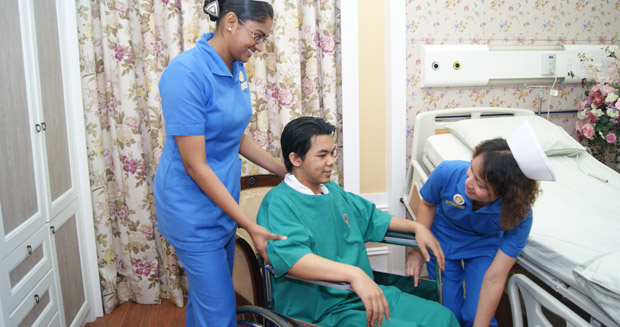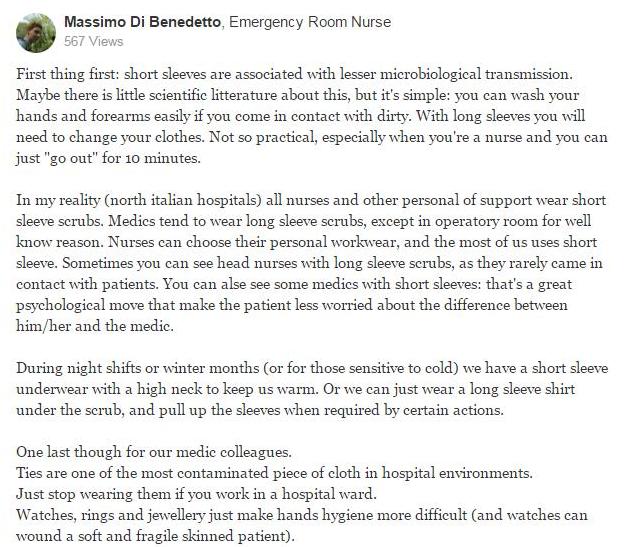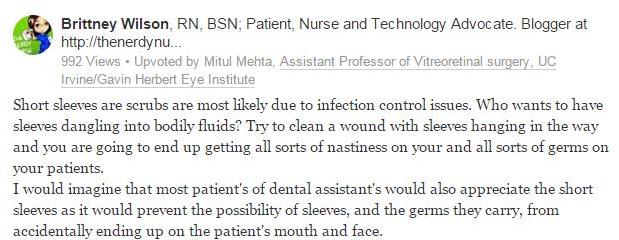Should Muslim Nurses Be Given The Option To Lengthen Their Sleeves?
A look at the reasons behind why most medical professionals prefer wearing short-sleeved uniforms.
It is a fairly common practise for public places and workplaces to observe a particular dress code in most parts of the world.
However, Malaysia, as of late, has been facing quite a number of problems related to dress codes; with many expressing their dissatisfaction about complying with these dressing etiquette.
Just last week, a nurse from a local private hospital, claimed that her employers sacked her after she insisted on wearing long-sleeved uniform to cover her aurat
Naziah Sauni Samat, 24, said the hospital management wanted her to don short-sleeves instead.
"I believe it is my right to wear long-sleeves. The management asked me to cut, cut and cut, until the entire hospital asked me to do so as well.
"In the end, my employment was terminated," Naziah told a press conference at the Malaysian Muslim Consumers Association (PPIM) office in Kuala Lumpur today.
The young nurse brought the issue to the Malaysian Muslim Consumers Association (PPIM) after being sacked by the hospital.
According to Naziah, the employment terms did not indicate that nurses were not allowed to wear long-sleeved uniforms
Prior to her dismissal, she said, the hospital did not state that long-sleeved uniforms were not allowed.
According to her, she was only told that she needed to wear a white uniform, tudung (headscarf), shoes and socks.
Furthermore, Naziah claimed the management also disallowed her from wearing 'arm sleeves' (stokin lengan) to cover the exposed part of her arm.
However, she pointed out that nurses with Hospital Kuala Lumpur are allowed to wear long-sleeved uniforms.
Slamming Naziah's allegations, the Damai Hospital Nursing Department claims that they fired her because she was "stubborn and insubordinate"
Damai Service Hospital (Melawati) however said Naziah Sauni Samat was not sacked because she insisted on wearing long-sleeves but was instead fired due to disciplinary problems.
The hospital’s finance and administration manager Regina Sundram said Naziah did not come to work for two days consecutively without providing any reason for her absence.
“She was not sacked for wearing a long-sleeved uniform,” Damai Hospital's Finance and Administration Manager, Regina Sundram told Malaysiakini.
“She did not tell the administration that she would be absent. As such, we consider her services as being automatically terminated,” she said, citing the Employment Act.
"We don't allow long sleeves not because we are against anyone's religion but for safety reasons," the statement read.
The department also said that Naziah was informed of the short sleeved uniform when she was hired.
"We did not renew her contract for the year 2015 and 2016 because we were concerned over her emotional outburst, and its effect on the patients."
The private medical centre also lamented about how they have been getting phone calls from patients demanding to only be served by nurses clad in long-sleeved uniforms, after Naziah publisised the issue
The nursing department added that since the case become public, they have received calls by people requesting they only served by nurses in long sleeves.
"Now a hospital is treated like an entertainment centre where you can choose the type of nurses to serve you before a treatment is administered. This is very sad," it said.
It added that even Muslim staff of the hospital stand behind the management's decision to stand firm over the disciplinary matter.
The statement was signed by nurses Sugenthei Raman, Norzilawati Sarip, Katina Ibrahim, Uma Devi Subramaniam and Vijitra Sahadevan.
In response to Naziah's allegations, Damai Service Hospital (Melawati) is looking to sue the young nurse for her complaints against the management and her dismissal
Damai Hospital says it will take legal action against a nurse who claimed she was terminated after she was not allowed to wear long sleeves to observe the aurat (Muslim code of modesty).
"We will meet with our lawyers tomorrow. I have told her on Dec 3 that our lawyers will take action against any accusations and allegations she is going to make (over the matter).
Shedding light on the issue, Damai hospital's Finance and Administration Manager, Regina Sundram, explained that the hospital requires its nurses to wear short-sleeved uniform to avoid risk of infection and ease of movement while doing work
Meanwhile, Regina said the hospital - which started its operations in 1989 - has existing guidelines which state that non-Muslim nurses must wear long pants and short sleeves to work while Muslim nurses must similarly wear long pants, short sleeves and a small scarf (anak tudung).
“Short sleeves will prevent bacterial infection and make things easier for nurses to do their tasks,” she said.
She added that the hospital had given Naziah the opportunity to decide whether to continue working there or otherwise.
However, Naziah came to work wearing arm sleeves (stokin lengan) and had therefore gone against the hospital's dress code.
Making matters worse, the Malaysian Muslim Consumers Association (PPIM), apparently threatened the hospital with racism charges for not allowing Naziah to wear long sleeves
Regina also denied charges of racism and religious bias over the issue and stressed that Naziah should have understood the hospital’s regulations.
“Don’t raise the issue of racism… Naziah had tried to do that previously,” she said.
The private hospital had earlier lodged a police report against PPIM.
According to the police report, PPIM went to Damai Service Hospital last month and had tried to threaten the hospital with charges of racism for not allowing Naziah to wear long sleeves.
Meanwhile, talking about following the Malaysian constitution, PPIM's chief activist Nadzim Johan, thinks that "we must follow the Islamic way" (nurses' dress code)
"We are surprised with this institution. In the context of our constitution (we must follow the Islamic way). But if we are in the United Kingdom, we have to follow the way there, follow their constitution," Nadzim said.
He urged the Health Ministry and Islamic Development Department (Jakim) to explain the matter.
So, the question comes down to why short-sleeves for medical staff?
Most medical associations and professionals conclusively believe that wearing short-sleeved shirt or uniform while at work helps to reduce and limit the chances of infection.
Julie Hughes, a nurse consultant in infection control at 5 Boroughs Partnership NHS Foundation Trust, thinks that long sleeves can easily be soiled with bodily fluids, thus it is best to comply to the "bare below the elbows" rule when dressing to work, as mentioned in the Nursing Times website.
The Society for Healthcare Epidemiology of America (SHEA), recently urged hospitals to encourage their medical staff to wear short-sleeved uniforms, avoid wearing wristwatches, jewelry and neck tie at work to best prevent the spread of infections
Doctors should wash their white coats at least once a week in hot water and bleach, according to the article.
Although there is no known direct link between the germs on healthcare workers' clothing and actual infections, it's best to take precautions, experts said.
"There's a theoretical basis that if you have clean clothes, you have less chance of transmitting a pathogen," Gonzalo Bearman, M.D., a hospital epidemiologist with the Virginia Commonwealth University System and a member of the SHEA guidelines committee, told NBC News.
Studies on the subject suggest sleeves, pockets and other parts of healthcare workers' coats and scrubs can harbor germs like Acinetobacter and Pseudomonas, NBC News reported. One study found that a third of doctors' neckties grew Staphylococcus aureus in the lab. Several found that the germs were often resistant to the top drugs used to treat them.
Adding to that, the British Medical Association's (BMA) dress code states that medical professionals should wear short- sleeves when working with patients
Based on a question asked on Quora, a question and answer website, on why scrubs are usually short-sleeved, most medical professionals agree that wearing short sleeves is practical and reduces the risk of infection
Hence, it is safe to say that most medical centers and professionals around the world comply to the short sleeves dress code to lessen the risk of infections while attending patients and working in an infection-prone space
Nevertheless, there are a number of hospitals that allow their nurses to wear long-sleeved uniforms and they usually differ according to their designated position
The nurses wearing long-sleeved uniforms are usually the ones that deal with clerical and administration work in the hospital as opposed to the ones dealing with the patients, directly.






